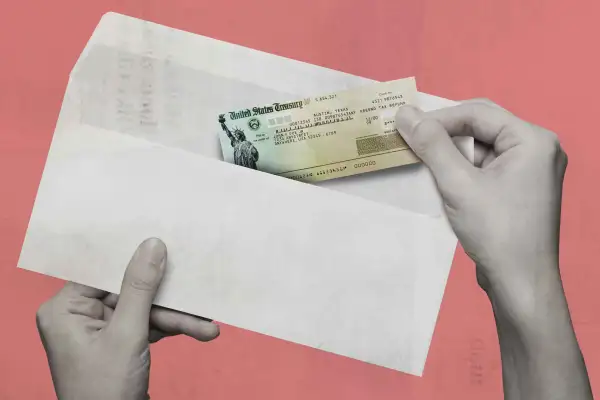IRS Warns Tax ‘Refunds May Be Smaller in 2023’

When you file your taxes in 2023, don’t be surprised if your tax refund is a bit smaller than it was this year.
In an announcement Tuesday encouraging taxpayers to prepare for the upcoming tax season, the IRS warned folks to temper their expectations for their next tax refund.
“Refunds may be smaller in 2023,” the IRS said. “Taxpayers will not receive an additional stimulus payment with a 2023 tax refund because there were no Economic Impact Payments for 2022.”
The government began sending out the last official round of federal stimulus checks — aka Economic Impact Payments — in 2021. But because many eligible folks did not directly receive their stimulus checks that year, they were able to claim the amount they were owed when they filed taxes in 2022. That boosted the tax refunds for millions of Americans much higher than usual.
There was not another round of stimulus checks in 2022, so that situation won’t happen again.
Who gets a tax refund? What's the average amount?
IRS data shows the average tax refund paid out earlier this year was indeed much higher than previous years. For example, the average refund in 2022 was $3,176, nearly a 14% increase from the previous year’s refund of $2,791. In 2020, the average refund was about $2,550.
While not all tax filers receive refunds, most do. Of those who filed in 2022, two-thirds received a tax refund from the IRS, agency data shows.
Although millions heavily depend on refund checks each year, the IRS advises against that strategy.
“The IRS cautions taxpayers not to rely on receiving a 2022 federal tax refund by a certain date especially when making major purchases or paying bills,” the agency stated. “Some returns may require additional review and may take longer.”
In fact, the agency is still processing millions of tax returns. The IRS said it is still working on 3.7 million unprocessed returns that it received this year. Many of them contained errors, the agency said. Overall, the IRS was plagued by processing delays and poor customer service this year, according to a report from the National Taxpayer Advocate, an internal IRS watchdog.
While the IRS no longer has to deal with pumping out tens of millions of stimulus payments, a new rule enacted by the American Rescue Plan is in effect for the upcoming tax season. The rule affects many folks with side hustles who use third-party payment services like PayPal or Venmo — or sites like Facebook Marketplace, Ebay or Etsy.
In short, those companies are now required to send out 1099-K forms to anyone who used their platform to sell more than $600 worth of goods or services (gifts or personal payments do not apply). Previously, the threshold was either 200 transactions or $20,000. Folks who did not meet that threshold in previous years were still supposed to report their income to the IRS, but tax experts say many people don’t know that they’re supposed to file — or in some cases ignore that requirement — if they don’t receive documentation.
Now, that new documentation is coming, and many will be filing taxes on their side hustles for the first time. This too could contribute to a lower tax refund for certain filers — and if the returns contain errors, that could in turn create further delays with the IRS.
To prevent another massive backlog from happening next year, the IRS is on a hiring spree. The agency said at the end of October that it has already hired 4,000 new customer service staffers and plans to add another 1,000 by the end of year.
To increase your chances of a speedy return, the IRS recommends that you file electronically and sign up for direct deposit.
More from Money:
5 Best Tax Relief Companies of 2022
17 States Giving Out Stimulus Checks and Tax Rebates This Fall

